
A recent auction to sell off Curt Schilling’s 38 Studios’ IPs has ended with no one buying the studio’s two biggest properties, Kingdoms of Amalur: Reckoning, and the unreleased MMORPG Copernicus. According to a report from the Providence Journal, however, the games Rise of Nations, Rise of Legends, and Catan for Xbox Live were sold along with the trademark for 38 Studios’ subsidiary Big Huge Games.
The auction, which took place last Wednesday, managed to take in $320,000 for the properties it was able to sell. But according to Richard Land, the lawyer running the auction on behalf of the court appointed liquidation service Heritage Global Partners, claimed that the “The Receiver did not receive acceptable offers for the remaining lots, including Project Copernicus, 38 Studios’ in-development Massively Multiplayer Online Role Playing Game, and Helios, 38 Studios’ integrated social media platform.”
The $320,000 will barely scratch the surface of the massive debt 38 Studios accrued. After former baseball player Curt Schilling founded the company in 2006 in Massachusetts, the state of Rhode Island offered the studio a $75 million loan in 2010 if it moved states. In return, 38 Studios promised to bring 450 jobs to Rhode Island by the end of the year. Following the move, 38 Studios managed to release a single AAA game, Kingdoms of Amalur: Reckoning. Despite positive reviews and 1.2 million copies sold in the first 90 days, Amalur was deemed a financial failure. Then things began to unravel.
Not all of the facts are known yet, but the state of Rhode Island is claiming that Schillings essentially lied to it. 38 Studios missed a scheduled payment and sent in a $1.2 million check, but it had insufficient funds to cover that amount. 38 then failed to pay its employees. Then executive staff, including the CEO and SVP, suddenly left the company.
Rhode Island soon began an investigation into the studio and discovered that it had never reached the 450 employee mark, and that funds were badly mismanaged. Schilling himself was accused of using $4 million of the loan to repay his own investments into the company. More damningly though, the investigation suggested that Schilling always knew the development costs would be at least $20 million more than the studio could raise (even with the loan), and he failed to reveal that when negotiating with Rhode Island’s Economic Development Corporation. That will be difficult to prove, but it may be construed as fraud.
In June of 2012, 38 Studios filed for bankruptcy and dissolved. Between the principle and the interest, the loan leaves the state of Rhode Island with more than $112 million unpaid. Investigations are still underway, including one from the Securities Exchange Commission.
As for the auction, it has not been revealed who purchased the products that did sell. It’s also unclear if the bids were insufficient on the remaining properties, or if there were no bids at all.
Along with the unsold rights to Amalur (which includes the current game and the right to further develop the property) and the unreleased MMO Copernicus, the auction was also hoping to sell 38 Studios’ customer relationship management software, Helios. Hunt has stated that he will continue to try to sell the remaining properties.


